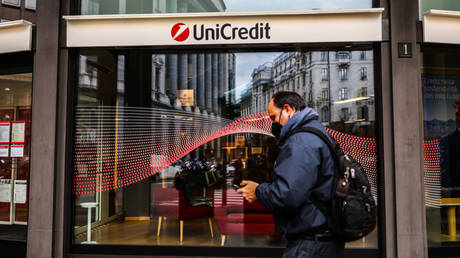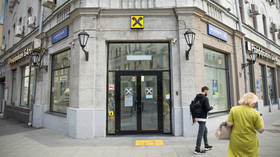Italy’s UniCredit could reportedly face sanctions for continuing to do business in the country
The European Central Bank (ECB) is planning to require UniCredit, Italy’s second-largest bank, to limit its business in Russia, Reuters reported on Friday, citing two unnamed people with knowledge of the discussions.
UniCredit is one of the few foreign lenders to have kept operations in the sanction-hit country despite the Western sanctions imposed on Moscow since the beginning of the Ukraine conflict.
The demands of the ECB are reportedly similar to those the regulator previously sent to Austria’s Raiffeisen Bank International, the largest Western financial institution still active in Russia.
The sources told the news agency that the regulator intends to send UniCredit a legally binding request that it pare back its operations in Russia. This request is reportedly the penultimate step before possible penalties, such as fines, are imposed.
According to another person with knowledge of the issue, a formal warning from the ECB to UniCredit would offer the Milan-based lender a final opportunity to avert an enforcement procedure that could lead to sanctions.
Earlier this week, Raiffeisen said that the EU regulator was building up pressure and demanding that the lender decrease loans to customers and significantly reduce international payments originating from Russia.
Raiffeisen and UniCredit, which have been operating in Russia for more than three decades, have drawn scrutiny from financial authorities in the US as well, the sources told Reuters.
In 2023, the Russian unit of UniCredit reported pre-tax profit of €890 million, about 7.7% of the group’s total compared to pre-tax profit of €210 million recorded in the pre-conflict year 2021. In February, UniCredit CEO Andrea Orcel said the bank’s Russia strategy remained unchanged, and that the lender was continuing to scale back its business in the country.
As per Reuters, the Russian unit’s loans in 2023 halved versus the previous year, while the number of employees declined by nearly 8% to 3,150. Nevertheless, revenues saw a year-on-year increase of 17% as bank fees rose.






